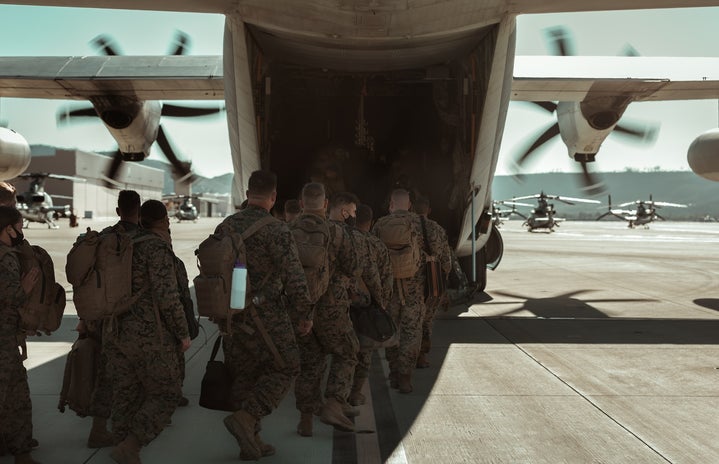Many people prioritize their physical health, whether to feel or look good, but not many people take the time out to actually put their mental health first. On the civilian side of life, you have your family, your friends, just someone that doesn’t make life lonely. What about service members? The most talked about mental health challenges service members face are PTSD and depression. It doesn’t stop there, there’s anxiety, insomnia, BPD, and many others. These are issues that we as civilians should consider and be aware of. Here today I have veteran, La’Kaya Bowers from Columbia, South Carolina, to shed light on mental health in the military with her peronsonal experiences.
Tkhai Heyward: “Hey, how are you today?”
La’Kaya Bowers: “Hello, and I’m doing alright.”
Tkhai Heyward: “That’s good, well thank you for coming to talk to me today. Let’s jump right into it, where were you stationed and how long were you there?”
La’Kaya Bowers: “ I swore into the military in 2020. I went to BCT and AIT on Fort Jackson in Columbia, SC. As many know, BCT was basically the beginning of my service time from civilian to soldier. In AIT I was learning to become a 42A, mos of a Human Resource Specialist. Therefore as 42s our job basically consist of dealing with all types of paperworks such as finacial, awards, leave forms, personal information, promotions, and etc.”
Tkhai Heyward: “That sounds stressful but interesting at the same time, it must’ve been alot to battle with on top of trying to stay on track with your mental health. On average how many people in the military do you know that have some sort of mental health issue?”
La’Kaya Bowers: “In my time in service, 2 out of every 3 service members that I have crossed paths with and/or became close to have/had some sort of mental health issue.”
Tkhai Heyward: “Okay, so when exactly did your mental health issues start?”
La’Kaya Bowers: “Everything was great at first as far as basic, but towards the end of AIT was when it all started. I began to have insomnia and anxiety attacks. Certain drill sergeants cared but some did not. I say this because the sergeants wanted us to separate our personal life from work and that was just something that I was having trouble with. Nonetheless, I graduated from AIT in February 2021 and was stationed on Fort Carson in Colorada Springs, Colorado. I was stationed at Fort Carson for a year and 2 months, I retired this past April.”
Tkhai Heyward: “How was your mental health in Colorado?”
La’Kaya Bowers: “ I already felt as if home wasn’t home, but just up and moving to Colorado was a drastic change for me. In the beginning, it was very dark.”
Tkhai Heyward: “Not to cut you off but when you say “it was very dark” what exactly do you mean?”
La’Kaya Bowers: “I was always angry, I couldn’t sleep or eat, I had suicidal thoughts, I was depressed, sad, and confused. Honestly, If I was heard in AIT about my mental health and I was taken more seriously my military career would’nt have been cut short and I would have had a grip on my mental health more sooner. I had ones around who showed they were there for me, and made me feel a little better, but I still somehow felt alone. Through all of my mixed emotions I had one who saw me for me, the ugly, depressed, giving up me. When my battle came I felt like I could handle all the bad days because I knew I had someone I could confide in. Fast forward, After I got out and came back home to South Carolina I was good for the first month but then my mental health started to decline again.”
Tkhai Heyward: “Thank you for elaborating deeper, did your mental health play a part in you retiring from the military?”
La’Kaya Bowers: “Yes. To me the military viewed my suicidal thoughts, insomnia, anxiety and depression as adjustment disorder instead of what they actually are. I did’nt have a problem adjusting. I was great at my job, my personal skills in the beginning were’nt as perfect. Though, over time it did get better. As I said before, if someone took their time and listened to me while I was in AIT I believe I would’ve got a hand on my mental health sooner.”
Tkhai Heyward: “How did your mental health affect your everyday life in the military and now?”
La’Kaya Bowers: “In the military it shut me off, it made me angry, and made me not want to listen. It made me speak how I felt instead of learning. Of course, I got my work done but if I wasn’t in a good head space my person wouldn’t be good either. Now I’m quiet and I usually want to stay to myself. I feel lost and confused. I tend to question myself a lot.”
Tkhai Heyward: “Is there anything you want to say to someone in the military struggling with mental health issues?”
La’Kaya Bowers: “Yes two words: keep pushing. Keep pushing when you feel like you can’t turn to anyone. Keep pushing when you feel like no one understands what’s like being a soldier. Keep pushing because even though you might not think the military will not have a good effect on your life, coming from me looking back at it, it will shape you into the person you are when you look back. Take the people you associate yourself with as they are meant to be. Whether they are good or bad because you will always meet good and bad people they will shape you. Although they have their ways and flaws, the whole military, every single branch is a family and family is forever.”
Tkhai Heyward: “Those words were beautiful truly. Again thank you.”


